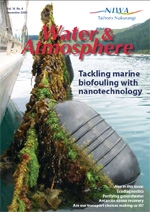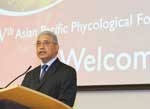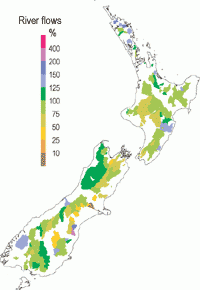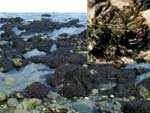PDF of this article (148 KB)



Phycologists flock to Wellington
Every second breath we take has been provided by the algae we share this planet with, so it’s not surprising that a conference focusing on algae in all their manifest diversity drew a wide range of people. In November, over 250 scientists, technologists, resource managers, and industry partners gathered for five days in Wellington at the Vth Asian Pacific Phycological Forum to discuss the latest developments and research in the area of phycology, and to promote international cooperation.
Phycology is the study of algae, which range in size from microalgae, such as phytoplankton, to macroalgae, which include seaweeds and kelp. Algae at both ends of the size spectrum are used extensively in the production of bioplastics, dyes, feedstock, pharmaceuticals, biofuels, and fertilisers. Seaweeds are also eaten in many countries, including New Zealand. There are about 30,000 species of algae in the world, including up to 10,000 seaweeds.
The theme of the Vth APPF was ‘Algae in a Changing World’. Topics on the agenda included the critical role algae play in carbon cycling and ecosystem dynamics in the coastal zone, algal taxonomy, and biodiversity. Speakers also addressed such questions as “How can we turn seaweed into biofuels?”, “Can we use seaweed to reduce greenhouse gas emissions?”, and “Can we stop the spread of didymo in New Zealand?”
Participants hailed from 25 countries including Malaysia, Korea, Japan, China, Thailand, Australia, and New Zealand. The Forum was officially opened by Dr Tumu Te Heuheu DCNZM, Paramount Chief of Ngāti Tūwharetoa and immediate past Chairperson of the UNESCO World Heritage Committee. This is the first time the event, which convenes every three years, has been held in New Zealand. The Forum was jointly hosted by NIWA, Victoria University of Wellington, and the Australasian Society for Phycology and Aquatic Botany, and sponsored by a number of scientific organisations and government departments.
In conjunction with the Forum there were satellite meetings of the Korean-funded Asian Network for Using Algae as a CO2 Sink, a workshop on ‘Photosynthesis and Carbon Acquisition Methods’, a meeting of the Asia Oceania Algae Collections Network, a meeting of the SE Asian Consortium for Marine Taxonomy, and an Advisory Council meeting of the Asian Pacific Phycological Association.
For further information, contact: Tracy Farr, 0-4-386 0601, [email protected] Dr Wendy Nelson, 0-4-386 0600, [email protected]
Tracing Bangiales whakapapa

When you next have a feed of karengo or sushi wrapped in nori, pause and think about the seaweeds you are eating. They are considered a taonga by Māori and are highly valued throughout the world for food.
The Bangiales – bladed algae classified as Porphyra and their close cousins, filaments classified as Bangia – are much more diverse than previously realised. This discovery is due mainly to work carried out over the past decade by a team of scientists from NIWA and the University of Otago.
Phylogeny is the study of evolutionary relationships between organisms; major insights about Porphyra and Bangia have been possible with the use of molecular phylogenetic analyses. With these techniques we are able to build whakapapa and trace the relationships between species based on their DNA.
In mid November, NIWA hosted a workshop on Bangiales phylogeny with 13 participants from Japan, Korea, Brazil, Canada, USA, UK, and NZ. The first meeting of the Bangiales Consortium occurred last year in Kobe, where a group decided to undertake a global analysis of these algae. At the meeting held at NIWA in Wellington, the international group was able to discuss the results of analyses of a very large dataset contributed by workshop members, coordinated and analysed by Dr Judy Broom (University of Otago) and Dr Wendy Nelson. We made significant progress as members pooled their knowledge and considered the implications of the results.
For further information, contact: Dr Wendy Nelson, 0-4-386 0600, [email protected] Tracy Farr, 0-4-386 0601, [email protected]
